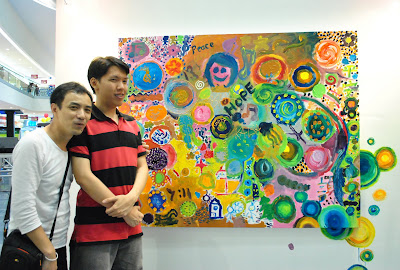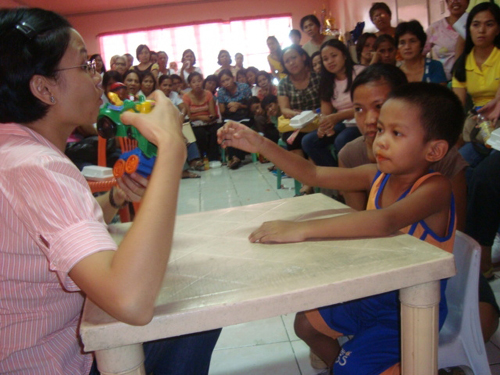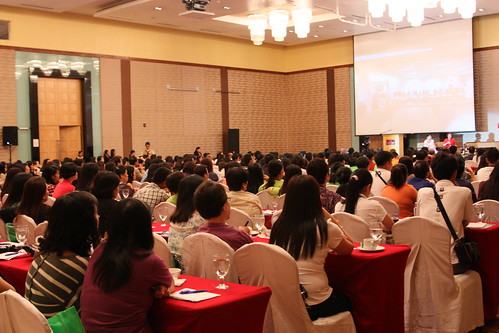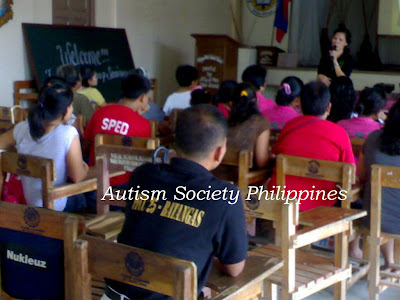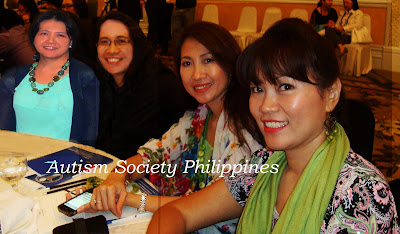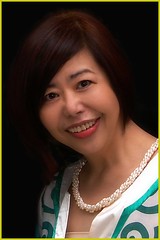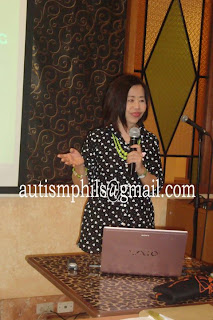By DANG U. KOE, ASP Chair Emeritus
For parents distraught after diagnosis of their children’s autism, these questions often immediately crop up.
In the Philippines, there are still no known cases yet of persons in the autism spectrum disorder (ASD) who got married and raised their families. In countries like the United States and the United Kingdom, there are confirmed reports of such cases, but these are those who were diagnosed with Asperger’s Syndrome.
Asperger’s Syndrome is considered as the “milder variant” of developmental disorders falling under the ASD. In general, Aspies (as they are popularly called in US) are capable of functioning in everyday life. This is mainly because unlike those with “classic autism”, they have communication ability and with average (or sometimes above average) IQ. However, Aspies have significant difficulties in social interaction (including using language in social context), and behaviors maybe seen by others as odd or eccentric.
‘I HAVE AUTISM’
Elijah Wapner is a budding stand-up comedian in New York. He was featured in an episode of MTV’s “True Life” titled “I Have Autism.” He was diagnosed with Asperger’s Syndrome at three years old.
Because of Elijah, his mother speaks on parenting strategies, improving and creating programs for individuals with autism spectrum disorders, preparing for college and the college search, strengthening advocacy skills, and fostering emerging talents and focused interests.
Elijah’s mom, Valerie Paradiz, PhD, is a member of the Bankstreet College of Education’s Institute for Cognitive Diversity.
 |
| Valarie Paradiz and her son Elijah Wapner |
In an advisory capacity, Valerie serves the US Autism & Asperger Association (USAAA), Pace University’s Center for Teaching and Research in Autism (TARA) and the editorial board of The Autism File magazine.
Valerie has two books forthcoming with the Autism Asperger Publishing Company (AAPC) relating to building strong educational programs and advocacy skills for students and adults with ASD in public and private settings. Outside the autism fields, she enjoys an active career in literary and non-fiction writing But for many years Valerie had identified herself as having “shadow syndromes” of autism. “I have deep and focused interests like meteorology, especially tornadoes and other types of extreme weather. I also have extreme sensory issues that impact my life on a daily basis.”
At some point her Aspie friends approached her and said “Val, you’re busted! We think you’re ‘one of us’!”
******
It’s very rare to hear of a parent discovering her own autism after the diagnosis of her own child. We can just imagine the whirlwind of experiences you both went through. Tell us how this has affected your lives.
Elijah had always been a “high needs” baby, with slow speech development and severe gastro intestinal (GI) discomfort (colic). When he was almost three years old, Elijah began having seizures. It catalyzed concern for his condition, so I had him evaluated by a pediatric neurologist. By age 3, he was diagnosed with autism.
Elijah participated in early intervention programs. From first to fourth grade, he did very well in special education (SpEd) class in public school. In fifth grade, he began experiencing suicidal thoughts and was in a serious crisis. One day he came home so distraught. I tried to find out and with some effort, he told me what happened.
Their school had an awards assembly towards the end of the school year. Many were receiving awards for achievement. When the assembly ended with no one in his SpEd class acknowledged or celebrated, he had a serious breakdown and was sent to the psychologist’s office. Then, he had to be sent home. It was heartbreaking.
That moment changed my life. I decided to give up my career in academia (I had taught at the university level for 13 years). I proposed a new school program to a philanthropist. She supported and funded the program for three years. It was truly amazing and it filled a great need in our community. Unfortunately, a new district superintendent had to cut the program. So, I moved on to New York University to help design a school program that was based on my model.
WHAT IS ASPIE PROGRAM?
ASPIE or School for Autistic Strength, Purpose, and Independence in Education, is a full day school program for middle and high school students diagnosed with Asperger’s Syndrome and related conditions. ASPIE School offers all the standard academics, tailored specifically to individuals with autism.
WHEN DID YOU FIND OUT YOU YOURSELF HAS ASPERGER’S SYNDROME?
As both the founder and executive director of ASPIE School, this new job required me to have much more social interaction with co-workers than my previous job as a professor of German literature at Bard College, New York.
The stresses caused my sensory integration issues to become extreme, as did my insomnia and GI problems (which had been life-long). That’s when I decided to go to New York University Hospital to participate in a study of adults with Asperger’s syndrome. There I was diagnosed with AS.
HOW DID YOU FEEL WHEN YOU WERE DIAGNOSED?
It was an uncomfortable feeling. Many people knew me as a parent of child with autism. I had a rather public position as an advocate in the autism community. Now, I myself had Asperger’s. It has taken me these past six years to fully adjust, to learn how to talk about my diagnosis with others, and, at times, to know when to protect myself and not disclose my Asperger’s.
DESCRIBE YOUR ROLE AS A MOTHER WITH AUTISM TO YOUR CHILD WITH AUTISM. IS IT DOUBLY HARDER TO BE TAKEN SERIOUSLY BY OTHERS, OR DO THEY GIVE YOU MORE CREDIT KNOWING THAT BOTH OF YOU ARE ON THE SPECTRUM?
I think both. Usually, after someone gets to know both of us, they begin to see how wonderful it is to be on the spectrum and to parent a child on the spectrum. Elijah and I enjoy stimming (self-stimulatory or repetitive behaviors) together on various things. We allow each other space and acceptance for our differences. I think that’s what I like most about our relationship.
PLEASE SHARE INSTANCES WHEN YOU HAD TO DISCLOSE YOUR DIAGNOSIS AND WHAT WENT THROUGH THESE EXPERIENCES.
Shortly after my diagnosis, a grant from the school where I worked as a school director was suddenly withdrawn by the donor. I was told that the donor, a parent of a child more deeply impacted by autism, doubted my diagnosis. This was very upsetting to me and my fellow Aspies.
Together, we wrote a letter of complaint to the donor, explaining what life with Asperger’s is like, including the invisible quality of our challenges that many don’t see. Much to our surprise and delight, the grant was reinstated!
I learned from that painful experience that self-advocacy can be a powerful tool, as can support from fellow individuals with autism.
Some years later, I was interviewed and hired for a position at a large mental health agency. Everyone on the hiring committee knew I was on the spectrum. I moved to their community to get ready for this new and exciting job.
Then, one week before I reported for work, the agency administration changed their minds. They didn’t feel someone on the spectrum would be good for co-workers, and that I might influence them in the wrong way. I ended up having to move back to my home in Woodstock after that because I knew I wouldn’t have a fulfilling life in the community that had rejected me. According to the Americans with Disabilities Act, this was against the law and discriminatory.
HOW HAS THESE EXPERIENCES HELPED YOU BECOME A BIGGER ADVOCATE FOR AUTISM?
As you can see, it is a very tough road to be evaluated and diagnosed, and then to decide to be public about that. In spite of the sacrifices, I can look back and say I’m grateful for what I’ve learned.
Today, I’m very dedicated to issues regarding employment of individuals with ASD. It has become my passion and I have begun to do lots of consulting work assisting organizations and companies with developing employment programs. It’s very exciting!
I also train schools how to support emerging self-advocates with autism with a new curriculum that has just been published.
This curriculum in self-advocacy has blossomed into a new book, Integrated Self Advocacy. ISA™ is a curriculum and training series for educators and therapists who wish to support individuals with Autism Spectrum Disorders in achieving greater ability in self-advocacy.
I suppose that is the essence of being an advocate. We all take these risks, in the hope that it will make life better for the “Aspies” and “Auties” (persons with autism) who follow in our footsteps.
Acknowledgement Manila Bulletin, "
My son has autism..and so do I"
**********
This article was published last August 30, 2009 during the Autism Society Philippines’ 11th National Conference and the 1st South East Asian Conference on Autism last Oct. 24-25, at SMX Convention Center, Mall of Asia Complex, Pasay City. A post-conference workshop by Valerie followed last October 26 at Sky Dome, SM North EDSA, Quezon City.
